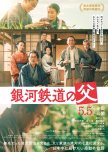
journey of memories, food edition
The synopsis is misleading, not in terms of events but in terms of pacing. The two-episode story isn't anywhere near as rushed thankfully. It's a wee road trip around central Thailand, focusing on the themes of memory, aging, love and food - and the ability of food to evoke memories and connection. With lots of cooking, local specialties, two temples, a cheeky elderly uncle who's always joking, a serious young man, two notable older actresses and another who I'm guessing is a noted Thai singer (will have to go back to get her name).If you get on with the Thai PBS way with a short story, these two episode series are a lovely way to spend some time and get to know something about another part of Thailand and its many cultures.
Was this review helpful to you?

Well worth seeking out
in 1998, mining waste contaminated with lead spilled into the Klity River in Kanchanaburi, western Thailand.This documentary is about the consequences for the people of a rural village 15 years on from the contamination. They are Karen, an ethnic minority, and depend on the river for food, water and their livelihoods. The river is their only source of water. We see their lives, their children, their land. It's shown in a gentle, beautifully filmed slice of life manner which makes it quietly powerful.
There have been clean-up efforts but news reports indicate that the river is still contaminated.
Was this review helpful to you?

More tragic love story than horror
The first half focuses on village life, Nak and Mak meeting and their early married life. The second half is a mix of comedy-horror, supernatural and tragic love story. The copy I found to stream was (re)dubbed and included strange "space-age" sound effects and much later music.The end, where they stopped speaking, I found more affecting. I'd very much like to see this with the original sound though that may no longer exist. (Edit: It may not have had recorded sound originally, only someone speaking the lines live while the film ran.)
Overall though, it was worth watching as part of the history and glimpses into early Thai cinema and how, in 1959, they presented life in the previous century.
Having seen Nang Nak (1999) first made it easier for me, with only rudimentary Thai, to follow the story in this version of the legend. The auto-generated English subtitles sometimes clarified, sometimes confused.
This mix of original and redub makes it hard to choose ratings, so I just gave it 7's across the board. The music in the dub was inconsistent - some of it was traditional and effective, some of it western and out of place. Likewise, I'm inclined to rate the original acting higher, but the dubbed voices lower. I watched this out of interest in the different ways stories are told and this mixture has its own place in that.
Was this review helpful to you?

Cinematic poetry
This is both a family drama of changing times in early 20th century rural Japan and a beautiful, poetic melodrama depicting a romanticised and idealised version of the life of an idealistic young man who, after his death, became one of Japan's most loved poets and writers. It feels a very fitting tribute for Miyazawa Kenji.So far in JFF Online I've seen three films which include arts and creativity - The Lines That Define Me (sumi-e ink painting), Single8 (1979-era amateur movie-making) and this one. In all of them, characteristics of the art form shape and inform the ways the stories are told. If Miyazawa Kenji had been a different writer, this would have been a different film.
Was this review helpful to you?

An ancient dance tradition, a gentle but determined child, and his family
Because there's no synopsis, I'll start with one.A shy young boy, Orca, becomes interested in Khon traditional dance because of a school art project. His mum is raising him and his sister Fern on her own so money is tight. She also knows how difficult this style of dance is as her mother was a teacher and she has painful memories of that time. Orca is determined nonetheless.
The young actor who plays Orca is delightful. It's a sweet story about the value of traditions, love and family. As Orca learns about the dance, so do we.
Information about Khon dance, which dates to the 1500s if not earlier, via this link https://en.wikipedia.org/wiki/Khon. It is based on the Hindu Ramayana and its style of masked dance combined with music and narration.
Was this review helpful to you?

Nakak = Masks
This is going to be a bit vague and brief. I haven't figured out how to touch on its themes without diluting its poignancy or giving important things away. If you're considering watching it, just go ahead. It's only two hours and, in my opinion, well worth the time.*This review is also written from the point of view of a western viewer who pays attention but still has much to learn. Some of my sense of disorientation came from the combination of a short story's brevity and it clearly being made for an audience who readily understands context I had to piece in from elsewhere, like SOTUS hazing, or wonder about. None of this was a deal breaker by any means - that sense of old but new-to-me things to learn about is lovely - and everything which needed to came clear in the end.
The beginning is uneven. A 40 year old actor plays a 1st year uni student in flashbacks. His SOTUS seniors look like they have lived. A lot. It skips around so it's not clear if it's a bit of a ghost story or what's really going on.* There's a brief touch of tourism promotion for the Dan Sai district (Loei province, NE Thailand) and a decent amount of education about one of their customs, the masks of its title.
As the series progresses though, it more clearly becomes a moving and poignant short story. I'm not telling you about what. If you want to know, watch :)
Perhaps it is also a love letter to the Dan Sai people. I hope to learn much more about them.
Was this review helpful to you?

"Let's be afraid together"
A single event brings four strangers into each other's lives. They're all very different and struggling with their own concerns, which leads to friction as well as understanding.This gentle lakorn takes on serious, heavy issues and wraps them in warmth and kindness. It's about friendship, acceptance and helping each other. It is beautifully done, from the gentle acoustic closing song to the quirky coffee shop with Mackintosh metalwork to the care that's taken with the progression of the characters' growth individually and in their friendships.
The characters feel real and believable, especially the four central ones, along with the issues they face and the changes they make in their lives. All in all, this is one of the most emotionally satisfying series I've seen.
Was this review helpful to you?

Less is so much more
The story for this is rich enough it could easily have been made into a full length film or series.It would have been less if it had. The acting and directing are exquisite. They convey everything they need to tell this story through a look, or a few words. Together, this richness and brevity make for an emotionally powerful story. There is nothing extraneous to dilute its impact.
Cinematography and music complement it well, making the perfect atmosphere.
Cannot recommend this one highly enough. It is quietly, gently, heartbreakingly beautiful.
Was this review helpful to you?

I understand this more after reading about it
This hour long film is a combination of documentary and fiction centered around actual events like the Fukushima tsunami, with Soto Zen Buddhist monks in three of the roles. There were moments I didn't understand, like why monks were walking through muddy land driving sticks into the ground. Reading reviews and interviews helped me make sense of it in retrospect. I don't feel qualified to give it a rating and would prefer not to make such a judgement from one viewing. I gave it a rewatch value of 10 as I think I would gain much from seeing it again, perhaps a few times. But I found its screening on the JFF+ Independent Cinema festival too late to do so.It's an intentionally unpristine view of monks and their struggles. It reflects on questions like whether allergies might come from the damage we've done to the world? What should our mission be in the present? What's needed at this time? An elderly and well respected nun gives her answers to the last two. For her, it is sharing the wisdom of the Buddha. How these practices are relevant to well-being and mental health in particular is shown through the monks' lives and advice on a suicide help line.
These are the articles I found most helpful:
https://www.asahi.com/ajw/articles/13055417
https://www.sousei.gr.jp/tenzo/en/
https://www2.bfi.org.uk/news-opinion/sight-sound-magazine/reviews-recommendations/tenzo-katsuya-tomita-buddhist-monk-hybrid
Was this review helpful to you?

This review may contain spoilers
While I'm wary of the potential of BL about BL fueling, subconsciously or not, fans' fantasies about strangers' sexualities, I've enjoyed Japan's comedic use of the scenario to have a good laugh at itself. BL Drama no Shuen ni Narimashita: Crank Up Hen in particular is both solid Japanese introvert BL and excellent spoofing of its tropes.Quite opposite to that, 25 Ji Akasaka de's use of the scenario allows it to lean heavily into its characters' self-conscious introversion, two young men who both feel all of their feelings intensely and struggle to express them outwardly. Acting is a way to get outside of themselves but also exposes them to new vulnerabilities. Their work on the series gives them the experience of behaving as if they were together and thus the space for their feelings to develop but also clouds their understanding of what's going on between them. Neither of them have the confidence to believe that the other's actions are more than a senior helping his junior get into character.
Shirasaki is as he is, whether that's from general social awkwardness or neurodivergence. He's thrown in at the deep end with this first acting job, after years of fruitless auditioning (throughout all of this, there's a lot said with a single line or expression). I don't know how much of it was camera-work, hair & make-up, or simply Niihara's skill as an actor, but he visually changes through the course of the series. It's not just his hair going from disheveled to tidy but something in his face. To play a novice actor who grows, perhaps not in confidence, but in experience? Well done. Komagine too, who told so much through his face.
The awkwardness in their early physical contact some complain about - if you watch it again, pay attention to how it shifts. They are telling a story with how they touch each other.
Years long infatuation is a useful but over-used convention. It's employed well here, adding both to Hayama's characterisation and intensifying his feelings quickly, which allows for greater emotional depth within a short run-time. They hold back explanation but it was always there in his expressions. The reason for it - that Shirasaki is the only one who sees Hayama for his acting rather than his appearance - matters a great deal.
Because this is about two young men, both needing to be seen and valued for who they are, both unable to see and value themselves, finally finding that in each other.
Was this review helpful to you?

Powerful lakorn about trauma and abuse
As of this writing, the tags are misleading and inappropriate. I'm compiling evidence (which means going back through every episode trying to find dialogue to screenshot) to get them changed.My changes to the tags were accepted early June '25. Please realise that reviews and comments made before then were primarily from viewers who expected it to be a lesbian romance/GL because that is how it was tagged.
-----
Rakkaew is a powerful psychological - almost Shakespearean - lakorn about trauma and abuse, sexism, controlling parents, control and abuse in other family/non-family relationships, and how the wealthy are able to use money, power and position to skirt the law.
It is dense and complicated, messy in content but well-structured in form, with callbacks, symbolism and use of parallels between characters. There's a lot going on but it's always clear, at least if you pay attention, especially to things like who is making incorrect assumptions and why Sai says some of the things she does.
And those stunning monologues delivered by Cris which wouldn't be out of place on a theatre stage. They explain a lot, like why Rangrong couldn't have been written as a male character. Amongst other things, societal and parental sexism are very much part of why she is as she is.
There is something of a romance tucked within but it isn't a focus. There are a lot of supportive friends, and a found family accumulating around Sai. The tags I'm asking to be added are mostly heavy but, like the majority of Thai works, it adds plenty of warmth, light and compassion to the shadows.
Three older characters say homophobic things. Three younger characters are very clear in explicitly saying the opposite. This is in keeping with the call for social change in things like approaches to parenting.
I don't know how the 1971 novel treated Rangrong, her mental illness, hatred of (abusive) men/assumption that men will be abusive, or her orientation. The title, Rakkaew (Taproot), has repeated thematic significance regarding parental love (or lack) and the consequences of how children are raised, which suggests those aspects were vital to the novel as well. In the hands of this director, writer and actors, the story is very much an exploration of deep trauma. They are careful to repeatedly and explicitly root Rangrong's actions, feelings and psychological state in the sexist abuse she endured.
And because sexism features so intensely in Rangrong's story, her character could not have been written as a man, even if it that would have made Sai's story more palatable to many here.
If you're looking for GL, this isn't it. If you're looking to watch as a form of fictional gossip, there's plenty to react to. If you're willing to give this your attention, it is compelling and absorbing - like a Shakespearean play with 18 hours to explore and reveal itself.
And it is very much worth that time and attention. Rakkaew is amongst the best I've seen.
Was this review helpful to you?

Silly fun and serious messages
The Death of Khun Phra is difficult to talk about without spoilers, but there aren't many reviews so here goes.This constantly moving gem of a light lakorn has a big generous heart, (mostly) low stakes suspense, and at least a dozen twists and turns. To look at it through western eyes, it mixes genres and tones as readily as it combines historical and contemporary references. There's silly fun and serious messages, slapstick and drama, pop culture inserts and calls for equality which are still relevant today. It refuses to take itself seriously, and then it does. Very much so.
If you've seen enough Thai movies and lakorns, you're likely familiar with this flexibility from a culture which isn't exactly fussed about fitting into the limitations or expectations of tidy western genre boxes. Khun Phra takes that up a gear, and mostly hits its marks. There's one shift in the last episode I really wish they'd handled differently, but overall I found it easy to just settle in and follow along.
During the early episodes, I thought I'd love it for several reasons. By the time it ended, I loved it even more and for ones I wasn't expecting. I wish I could talk about those here but I don't want to take a chance of giving anything away.
Go with the flow as it takes us through its many twists, turns and surprises. It's well worth the attention.
(Rewatch value is high for me as I'm curious to see how things read differently now that I know its secrets. I'll give it some time though and hope I happen into the right lakorns to identify more of the references. Story and acting because I found it interesting and engaging throughout, with its small cliff hanger episode endings and the way the different parts layered together. And ... (not going to put it into words because spoilers.) Overall because I loved spending time in this world and they achieved what they set out to do.)
Was this review helpful to you?

Serious social commentary wrapped in comedy wrapped in lakorn
Did all the reviewers panning this for depictions of bad behaviour fail to realise how many of them were called out, whether in the dialogue, reactions, context or consequences? Sometimes the call outs were gentle, like Chon's maa telling him something he did was wrong, sometimes they were bold, like Chon's maa in the last episode. Sometimes through consequences.If you didn't see them, go back and look for them. Keep your eyes open to the variety of ways they're called out, explicitly or implicitly.
The series is a clear critique of toxic masculinity in several forms, including misogyny, objectification, peer pressure, outdated attitudes and of course homophobia. It's full of good messages and positive examples too.
This deserves to be watched with more attention than most here seem to have given it, including those who see it only as light-hearted fluff. It's laugh out loud funny, with the warm, open-hearted generosity of Thailand's best comedy, while also delivering important messages.
There's something else going on underneath, but it's left to viewers to put two and two together. Think about what we find out late regarding a key event in Tonhon's childhood. And then take that back in to something about him which is played for laughs and explained away as his being gullible.... It wasn't an over-used trope and sloppy characterisation, those two pieces fit together perfectly. And when they click into place, wow.
I've seen enough from the director to stand by these readings. He's very concerned with issues around sexism and parenting (another of his themes and the connection in a comment so it can go under a spoiler tag).
And he clearly respects viewers' intelligence too. Bring yours to the screen for this one.
Was this review helpful to you?

Wow
This is both a gorgeous pair of love stories and a crime mystery that's so intense it's difficult to watch at times. It goes deep on all the emotions, but it's worth trusting in it and giving it time, attention and patience.The writers, film editors and cast made a complicated plot line harmonize beautifully. I keep trying to talk myself out of writing that it's the best thing I've ever seen, but honestly, I can't think of another. Can't recommend it highly enough.
The site wants 500 words and I have many to go :) So things I really liked about it: great use of the theme music to underscore key emotional moments; that I could feel both Wu Yu's love for Tan Jiao and how she felt being in that love; the secondary characters who had their own growth and change; that as uncomfortable as the lowest lows were I've forgotten about them for the happiness and love; the gentle emotional sensitivity of many scenes.
I've not rewatched it yet but I gave it a high rating because there's plenty of complexity and things to watch out for through all the twists and because I really liked spending time with the four main characters and the music <3
Was this review helpful to you?

Some faithful, some reworked. War movie with OTT violence, and then one love story and another, success, betrayal, loyalty, magic, mythical sea creatures and special effects of dubious merit.
This isn't one to watch critically, better to just go along for the ride.
Was this review helpful to you?


 1
1 4
4 1
1 1
1




















